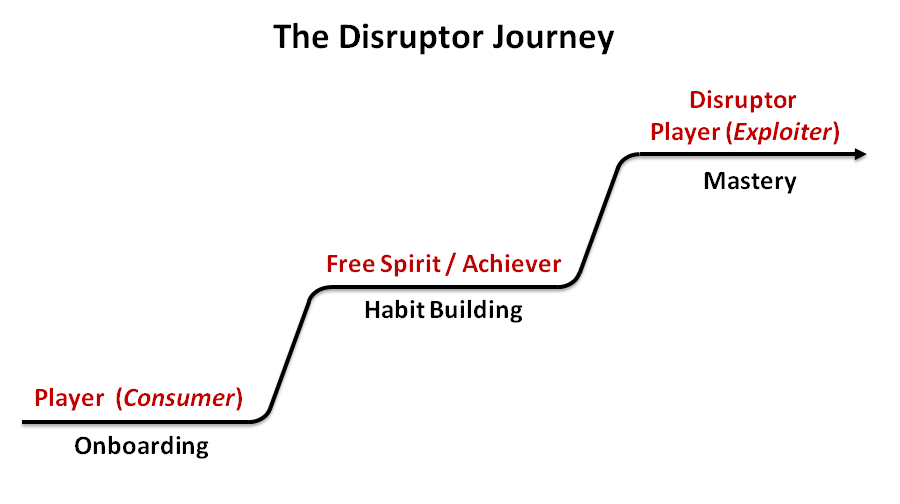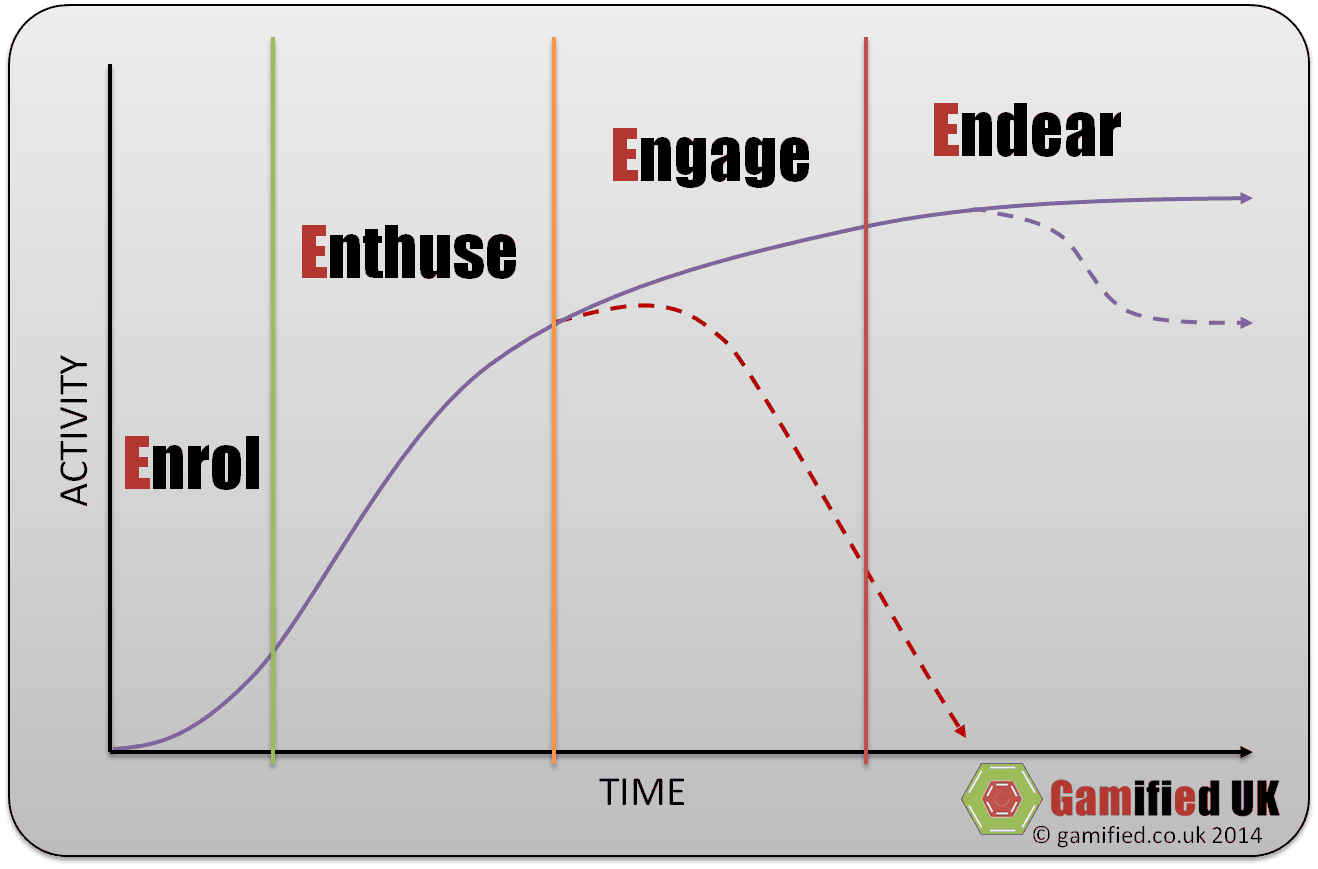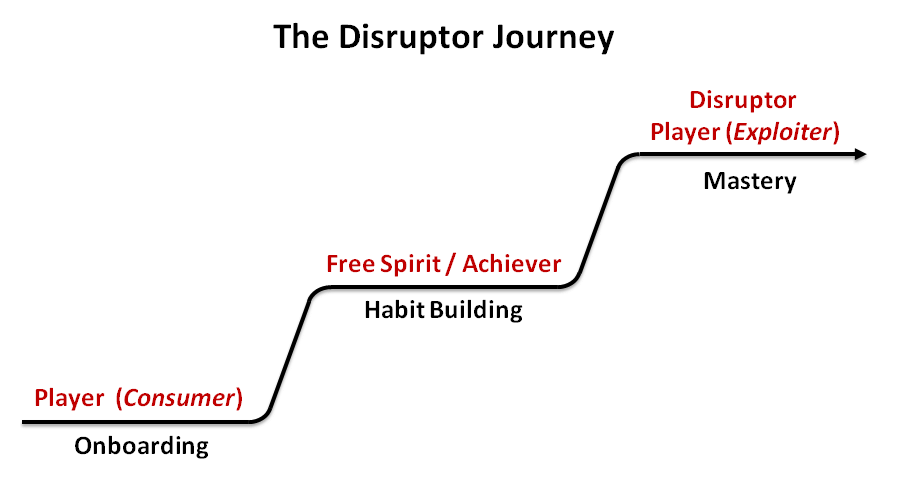Happy New Year everyone. I was going to start the year with a little article on how I problem solve, but an opportunity arose to write about something that I have been wanting to write about for a while!
When extrinsic rewards go bad
A couple of nights ago, I was bombarded with notices about comments on one particular blog post. Each was from a different, but similar anonymous email address and contained “Nice post xxx” where xxx was a number. Each comment also came from the same IP address. I was about to block the IP totally, when I noticed that the leaderboard on my site had one very clear leader. It also showed that had a very unusual stream of activity – multiple comments on one post, multiple likes and tweets and g+ across pages and more. They had found a loop hole in the way CaptainUp manages scores. I knew it would probably happen and truth be told the culprit was not a great surprise to me. What did surprise me was an article that he then published about his experience with gamified systems on my site and another.
In the article he explains how his interested in our sites went from enjoying “playing” with the system, through to enjoying the content and reading and exploring. This is exactly the sort of behaviour that these systems are meant to encourage. Encourage you to do more whilst you learn about the content. The goal being that people come back to enjoy content and not just the game. However, it all took a dark turn as he admits that “at this point fun became obsession, and weekly top ranking was no more engaging monthly was needed”.
What he was going through (other than a mild addiction) was Overjustification Effect, the extrinsic reward had overtaken his intrinsic motivation to be active on the site. He was no longer there to learn, he just had to stay at the top of the leaderboard.
The User Type Journey
This user’s journey is an interesting one and something worth dwelling on for a moment. If we map it out against Amy Jo Kim’s Player Journey and throw in my User Types, you can see how they evolved in the system.

At the beginning, they came in as a Player (Consumer type specifically). They were looking to play with the points and badges system, whilst learning how the system all worked. This was the onboarding phase of the journey.
Next, they began to enjoy learning from and exploring the content, putting them into the intrinsic “Free Spirit” and “Achiever” types. This was the habit forming phase.
However, the mastery phase took a sharp turn. Rather than staying on for intrinsic reasons, the game took over. Part of the reason for this was a lack of new and challenging content – “The new materials started to dry up, as I had no new activity to do, and still I was way behind the number one player”. So rather than being there to learn more about gamification from the content, they decided to learn how that game system worked and exploit it. At this point they became not just an Exploiter type, but a full disruptor. They wanted to prove the system was wrong whilst still beating it.
Is it cheating?
When I talked to him about this on Facebook, one of the things that came up was the fact he felt he had been treated unfairly by the system. For over a month, a bug had meant he was not getting points for certain activities. So, he decided that it was fair to game the system to recover the points he felt he was owed. This is a little bit like not getting a refund for something in a shop and then going and stealing from them until you feel the debt is paid.
The thing is, he had not really cheated. The system allowed him to behave in this way and there were no explicit rules written stating that this sort of behaviour would lead to some kind of penalty. The trouble is, we tend to believe that everyone in the world will behave to adhere to certain social norms, the truth is that this is not the case. Whilst he may have spoiled the game for others who were playing “fairly”, he got what he wanted – position on the leaderboard.
How do you handle this? The first thing is to make sure that if you don’t want it to happen, the system does not allow it. One option is to have a system that makes repeated behaviours in a day worth less each time. This makes it pointless to continue spamming. The other is to clearly state how you expect players to behave and have in place a system to penalise or ban offenders.
Also, remember that cheating is percieved differently by different people. Richard Bartle has a great presentation on this! http://mud.co.uk/richard/Lincoln.pdf
He once said that it is not possible to really cheat in a gamified system like you can in a game. In a game most voluntarily enter a social contract with other players, one that has implicit expectations of behaviour (gentlemanly conduct). With gamified systems you don’t do this, you are forced into it. Whilst this is true of some systems (enterprise being the biggest case for this), a system like CaptainUp is totally voluntary. No one is forcing you to play, so should you be expected to enter the same social contract of implicit expectations as a game? I think the answer is yes. Will everyone? This whole post proves the answer to that is no – of course not!
Lessons Learned
There are a few lessons here. The first is that CaptainUp needs some options to help limit repeat spamming, above just plain ban. The option to remove points that the moderator feels were unfairly awarded would be a nice start. Create a simple set of rules that can be seen easily. This will give more weight to decisions made about who is “cheating”. You can’t break the rules if there are none!
You need constant fresh content. If you have nothing but the game, then people will just play or leave – they won’t stay to learn as there is nothing to learn!
The other interesting thing is that in a weird way, the gamification worked perfectly. The user in questions has obviously learned a great deal as he explored the sites – his article proves that!
Head over to the users article to see his side of this, it is a fascinating read and an important lesson to us all! Confession of my engagement with a gamification system.
Similar Posts:
- Emergent Gamification?
- The EEEE User Journey Framework
- Rules, magic circles and other ways to avoid misfortune





Great article. Made me smile as I recognized myself here and there – I am saving up likes in order to get the next badge and I do confess to regularly checking up on my position on the leaderboard rather than reading your articles every time 😉 Have even thought about watching your very, very few (yes this was a slightly hidden complaint) videos multiple times in order to get a badge, but cheating isn’t the way I want to go. So I guess there’s still hope for me!
Hah. Yes. I am writing he next video based on creating simple pbl systems. Need to do a follow up on user types as well!!
Thanks for not bending the rules (cheat is such a harsh word 😉 )
You’re welcome.
And by the way – maybe you could just list some video examples in your articles, to give us a chance to reach the 25 and 50 videos badge 🙂
ahh.. so we are indeed gaming the system and on similar lines, though I did not see this, but made similar recommendation to the mod of this blog on twitter.. 😉
on the funny side, if you follow my steps, then the mod is gonna block both of us.. 😛
he has issued me a yellow card already.. 😉
Just checked Yu-kai blog, you are one of top 10 there as well, try to defeat me there, it will be easy for you but the path will be difficult.. 😀
All the best, I will check next Monday on your rankings on both blogs.. 🙂
I guess the answer from me should be: Challenge accepted! But it won’t be, not this time. I may be an Achiever, but right now I don’t have time to be an over-achiever. Have fun with your game 😀
will wait for some1 to catch up in next 2-3 months.. with 150k lead.. I am safe.. nd off the system.. 🙂
Aw man, I just lost my second place to the cheater. Not cool Achint 😉 I apologize in advance if this drives me to bend the rules :O
Game on… you have two places to defeat me by any hook or crook, one is here, other is Yu-kai blog, here I will keep it competitive, but on Yu-kai you need to work extra hard to defeat me. Though I have leverage at this place, as on the other blog I do not get points for comments, while other player do get.
There is a new badge to find that also has a video to watch 😉 Have to look pretty hard to get it now though 😀
it is not cheating, it is grunt work.. seems u r not a big fan of Yu-kai videos.. 😉
Another learning is that do not extend the leaderboard way beyond what the player can actually achieve, if by having content for 5000 point you make a leaderboard for 500,000 points, then also it is a problem. 10,000 is still acceptable (non spam comment .. ;))
That is an interesting point – never noticed how high legend is. So, in theory there are 140 points available on each post. (Comment, Like, G+,. Tweet, facebook share).
On this site there are about 160 posts and 20 pages. That gives you the chance to gain about 25000 points at the moment. This does not include logging in, getting new users on board and visiting.
I add 50 posts a year. So by the end of this year there would be another 7000 points to be had in this year – playing by one series interactions per post.
By the end of 2014, doing nothing other than the basics you could have 32000 points (Level 24). If you do more, like watch videos, add more comments, send more visitors etc, this will be more.
The game has to be able to last beyond the minimum, but as you say, 650,000 is not possible. As such, I have reduced the points needed to get to everything after Level 22 (the highest anyone has yet). The top level 30 is not 100,000.
I have also increased the point value of a few non basic actions 😉
what I was thinking about this in the morning inside the gym was, to keep the next to the next milestone hidden, making it curious. So like you show I have gained 1000 and xyz badge, and the next abc badge is at 5000, but above it is always hidden. So as your game expands so does the badges/levels.
That is one way to do it (not possible in CaptainUp). For some it is a good way to go, for others, they prefer to see the whole roadmap 🙂
sure, but since there is no definitive end in this case, hence this can be a possible cure.
Other point is, is it ethical for the moderator to play in the game (may write a blog post on it ), as he/she has the controls, what if he/she cheats, who will moderate then.. 😛
Depends on the game really. Personally i would not use the moderator power to change your score (for instance). I would say that a site that has lots of mods, they should have a different game. I used to do this for my review site. Public had punchtab, mods had a custom system I set up for rewarding new posts and moderator type stuff. They are two different behaviour sets. For general public I want engagement and shares. For admins I want contribution and help.
Now, on here, I am high up because I forgot about the system and that I was logged in to it and just left it. I am now always logged out, so can’t gain more points 😉
Foursquare is easily disrupted by cheating. Because so many locations are available to check-in to at any given time and GPS location, you can check into one then immediately check-in to another without moving. This not only falsely awards points, leaderboards, and badges, but also affects Foursquare’s location accuracy in the future. Eventually, if enough people play by the rules, Foursquare might be able to tell if you are cheating or not because you are too far away from a common check-in spot, but for now it’s totally possible to disrupt their system.
Agreed. The hope is that the minority play like that!